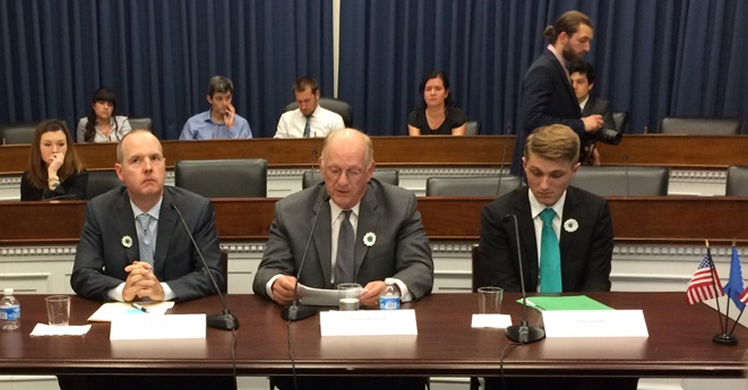Archived Content
In an effort to keep ICE.gov current, the archive contains content from a previous administration or is otherwise outdated. This information is archived and not reflective of current practice.
ICE's Human Rights Violators and War Crimes Center works to bring justice to Srebrenica genocide perpetrators
On the 20th anniversary of the Srebrenica Genocide, U.S. Immigration and Customs Enforcement (ICE) participated in an event in Washington, D.C., hosted by the Advisory Council for Bosnia and Herzegovina, to stand in solidarity with the victims and survivors.
The Srebrenica Genocide took place in July 1995 months before the end of the Bosnian war. Bosnian Serb forces took over a United Nations “safe haven” in eastern Bosnia, separated the men and boys from the women, bound their hands, led them away and shot them. More than 8,000 Bosniaks, mainly men and boys, in and around the town of Srebrenica, were killed. The fierce struggle for territorial control and ethnic cleansing also involved deliberate starvation, forced displacement, torture and rape.
“The people who committed the genocide are denying this ever happened, and the people are being victimized again,” Mirzeta Hadzikadic, president of the Advisory Council for Bosnia and Herzegovina, said in her opening remarks. “We are deeply grateful to the United States as the beacon of freedom and justice, not only to their own people, but to all people who are oppressed.”
Samir Osmanovic, a Srebrenica Genocide survivor, brought first-hand experiences of what took place in Srebrenica in July 1995 and prior. Osmanovic told of the three-year struggle, during which his father scrounged daily for food and water, trying to make sure his son and daughter didn’t starve. The day of the genocide was a time of panic “more than usual,” Osmanovic said. Choking up at times, he recalled his father’s disappearance, his grandfather being taken away by soldiers, his grandmother crying nonstop and the screams and gunshots they heard.
Speaking on behalf of ICE’s Homeland Security Investigations (HSI) Human Rights Violators and War Crimes Center senior historian Michael MacQueen discussed how ICE has been tracking down and bringing to justice perpetrators of the Srebrenica crimes.
MacQueen said that over the last few years, the unit’s work has resulted in removing to Bosnia two main perpetrators. Milorad Trbić, a security officer in the Bosnian Serb Army who helped make the arrangements and transmitted the orders to conduct mass killings, was removed as well as Marko Boskic, a member of the Bosnian Serb Army, who MacQueen said “confessed to having personally murdered between 80 and 120 men at the Branjevo farm mass killing site – he didn’t keep track.”
MacQueen also stated Trbić is part way through a 30-year sentence for his role in the genocide; and Boskic, after more than four years in federal custody, was returned to Bosnia where he pled guilty and entered into a cooperation agreement with the Bosnian prosecutors, which led to the arrest of four other murderers from his army detachment.
“A guiding factor in our investigations is the fact that Srebrenica was a huge operation,” said MacQueen. “It took thousands of men to carry out – not just the commander and the shooters, but also the planners, supply chiefs, coordinators, guards, infantrymen and gravediggers. Just because someone may not have pulled the trigger does not mean they did not assist in the achievement of genocide.”
MacQueen shared with attendees some of the lesser known cases – four members of Bosnian Serb military and police units, who were mobilized from their regular duties and participated in the genocide.
On their visa applications to come to the United States, all four of these men consistently lied about their wartime activities and whereabouts.
Through careful investigation, however, ICE’s War Crimes Unit was able to refute their stories. As a result, one of the perpetrators has been deported, two will likely be deported and the fourth perpetrator’s case is still in immigration court.
“These cases are hard to investigate and difficult to prosecute, especially in light of overcrowded immigration court dockets around the United States,” said MacQueen. “We don’t get to take these human rights violator cases to the head of the line. But it is on days like today, when we most acutely recall the immense pain and suffering of Srebrenica, a pain which has yet to diminish with the passage of time, that we are summoned by conscience and the law to redouble our efforts to ensure that the United States never is, and never can be, a safe haven for the perpetrators of these crimes.”


